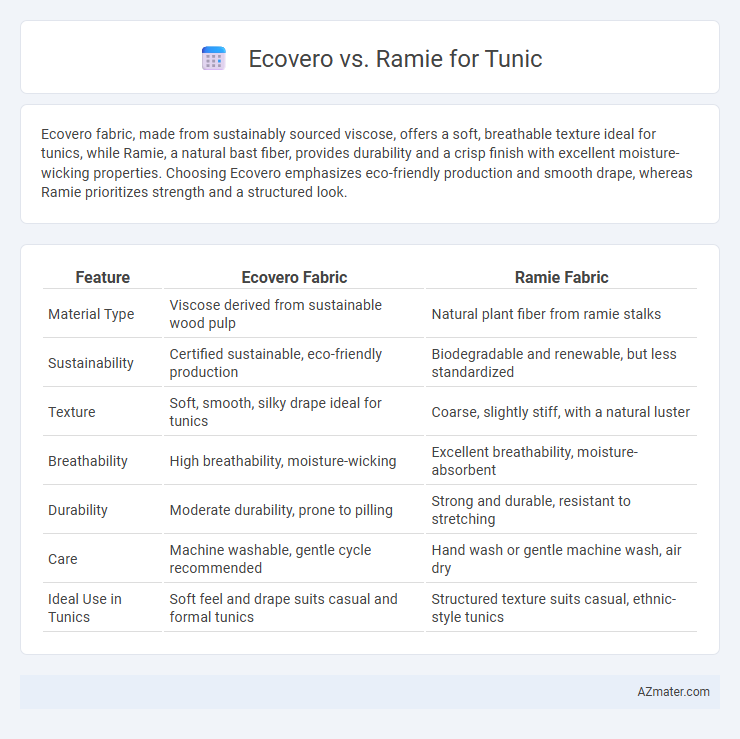Ecovero fabric, made from sustainably sourced viscose, offers a soft, breathable texture ideal for tunics, while Ramie, a natural bast fiber, provides durability and a crisp finish with excellent moisture-wicking properties. Choosing Ecovero emphasizes eco-friendly production and smooth drape, whereas Ramie prioritizes strength and a structured look.
Table of Comparison
| Feature | Ecovero Fabric | Ramie Fabric |
|---|---|---|
| Material Type | Viscose derived from sustainable wood pulp | Natural plant fiber from ramie stalks |
| Sustainability | Certified sustainable, eco-friendly production | Biodegradable and renewable, but less standardized |
| Texture | Soft, smooth, silky drape ideal for tunics | Coarse, slightly stiff, with a natural luster |
| Breathability | High breathability, moisture-wicking | Excellent breathability, moisture-absorbent |
| Durability | Moderate durability, prone to pilling | Strong and durable, resistant to stretching |
| Care | Machine washable, gentle cycle recommended | Hand wash or gentle machine wash, air dry |
| Ideal Use in Tunics | Soft feel and drape suits casual and formal tunics | Structured texture suits casual, ethnic-style tunics |
Introduction to Ecovero and Ramie Fabrics
Ecovero fabric, made from sustainably sourced wood pulp, is known for its eco-friendly production and soft, breathable texture ideal for tunics. Ramie, a natural fiber derived from the stalks of the ramie plant, offers exceptional strength and durability with a silky sheen, making it suitable for lightweight and breathable tunic designs. Both fabrics provide sustainable options, with Ecovero emphasizing environmental impact through certified eco-processes and Ramie popular for its natural resistance to wrinkles and moisture.
What is Ecovero? Sustainable Viscose Explained
Ecovero is a sustainable viscose fiber derived from certified renewable wood sources, produced under strict environmental standards to reduce water and energy consumption by up to 50% compared to conventional viscose. It offers a biodegradable, eco-friendly alternative ideal for tunics, ensuring softness and breathability while minimizing ecological impact. Ramie, by contrast, is a natural bast fiber known for its strength and durability but lacks the same sustainability certifications and environmental efficiency as Ecovero viscose.
Understanding Ramie: History and Key Properties
Ramie is a natural fiber derived from the stalks of the Chinese plant Boehmeria nivea, known for its ancient cultivation dating back over 6,000 years in Asia. Renowned for exceptional strength, moisture-wicking ability, and resistance to bacterial growth, ramie offers durability and comfort in tunic fabrics. Compared to Ecovero, a sustainable viscose made from certified renewable wood sources, ramie provides a unique textured appearance and improved breathability ideal for breathable and long-lasting tunics.
Eco-Friendliness: Ecovero vs Ramie Sustainability
Ecovero fibers are sourced from sustainably managed wood plantations, producing 50% less emissions and water impact compared to conventional viscose, making it highly eco-friendly for tunics. Ramie, derived from the stalks of the flowering plant Boehmeria, requires minimal pesticides and water, offering a natural and biodegradable option with low environmental toxicity. Both fibers contribute to sustainability, but Ecovero's certified closed-loop production process ensures fewer harmful chemicals and reduced resource consumption than traditional ramie processing.
Comfort and Feel: Texture Comparison for Tunics
Ecovero fibers offer a smooth, breathable texture that enhances comfort by regulating moisture in tunics, making them ideal for all-day wear. Ramie fabric provides a slightly stiffer feel with a natural luster and excellent durability but can be less soft compared to Ecovero, potentially impacting comfort during prolonged use. The choice between Ecovero and Ramie for tunics hinges on prioritizing softness and moisture management versus strength and a crisp, textured appearance.
Breathability and Moisture Management
Ecovero fibers, derived from sustainable wood pulp, offer superior breathability and excellent moisture-wicking properties, making them ideal for tunics in warm climates. Ramie, a bast fiber from the nettle plant, provides strong, durable fabric with moderate breathability but tends to retain moisture longer than Ecovero, potentially reducing comfort. Choosing Ecovero for tunics enhances airflow and moisture management, ensuring a cooler, drier wear experience compared to the heavier, less absorbent nature of ramie.
Durability and Longevity of Tunic Fabrics
Ecovero fabric, derived from sustainable wood pulp, offers moderate durability and is valued for its eco-friendly properties but may wear faster under frequent use compared to ramie. Ramie fibers, known for their exceptional strength and resistance to stretching and abrasion, provide superior longevity for tunics, making them ideal for garments subjected to regular wear. The natural resilience and moisture-wicking abilities of ramie contribute to maintaining the tunic's shape and texture over time, outperforming Ecovero in durability metrics.
Style and Appearance: Ecovero vs Ramie Aesthetics
Ecovero fabric offers a smooth, silky finish with vibrant color retention, making it ideal for tunics that emphasize sleek, polished aesthetics. Ramie, known for its natural linen-like texture, provides a rustic, breathable appeal that suits casual or bohemian-style tunics. Both fabrics enhance tunic styles uniquely, with Ecovero delivering refined elegance and Ramie showcasing earthy, textured charm.
Care and Maintenance Requirements
Ecovero fabric, made from certified sustainable viscose, requires gentle machine washing in cold water and should be air-dried to maintain its softness and color. Ramie, a natural bast fiber, demands more delicate care with hand washing or a mild cycle, avoiding high heat to prevent stiffness and shrinkage. Both fibers benefit from low-heat ironing to preserve the tunic's shape and fabric integrity over time.
Best Choice for Tunics: Ecovero or Ramie?
Ecovero fabric, made from sustainably sourced wood pulp, offers exceptional softness, breathability, and moisture-wicking properties ideal for tunics, ensuring comfort and durability in daily wear. Ramie, a natural fiber derived from the stalks of the Chinese nettle plant, provides strength, lustrous texture, and excellent breathability but tends to be stiffer and less flexible than Ecovero. For tunics prioritizing eco-friendliness, comfort, and drape, Ecovero stands out as the best choice over Ramie.

Infographic: Ecovero vs Ramie for Tunic
 azmater.com
azmater.com